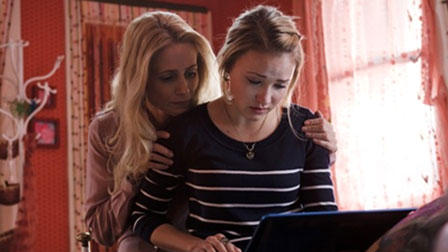Government of Indonesia and civil society organization have been doing many efforts to eliminate violence against women. However, violence against women is persistent. One of NGO that sustain effort to help women survivor of violence is Rifka Annisa, the first women’s crisis center in Indonesia. Working about 25 years in providing services and advocacy for violence against women cases, Rifka Annisa is welcomed everyone who want to learn and discuss about gender equality and violence against women problems in Indonesia. I was given the opportunity to talk with a counsellor of Rifka Annisa regarding this issue. This is my report on interviewing Ms. Wanda - Psychological counsellor of Rifka Annisa.
What do you think about the response of the Indonesian society when it comes to cases of rape and other sexual violence cases? Is it supportive or, instead blaming the victim?
Speaking generally, it’s better now. But you see, there are a lot of different types of violence, and Indonesian people respond to each one differently. For example, people are more supportive towards children rape victims, perpetrated by someone much older. But most people are still biased when it comes to dating violence, especially when it involves dating rape. People tend to assume it must be a mutual consensual sex since they are in a relationship. That’s why it does not make sense when the perpetrator of rape is their romantic partner. Another similar topic is marital rape which is rarely brought up in the public and even in the counseling settings. I think this has a lot to do with how much we understand the concept of consensual act.
Many people still consider one of main responsibilities as a wife is to have sex with her husband. Religious and cultural values might affect this, for example, people believe if a wife refuses any of the husband’ sexual advance, then she has sinned and wronged her husband. But I can only answer as a counselor who works closely with victims of violence. As for most people’ responses to that, perhaps you can ask friends in another division who work directly with the communities.
I think our social construct play a big role in shaping how we view women and men sexuality. For instance if husbands were to have affairs, it might be abnormal, but somehow acceptable because men are wired that way. And some people might blame the wife instead, “It’s because you are not pretty, that’s why your husband is looking elsewhere.” Some even advise the woman to “doll up” to fix this “problem”. Being cornered like this, the wife often emphasize the role of the other woman. There is a casual saying in Indonesian about “pelakor” (husband-snatcher); “Men are like cats, so it’s impossible for them to resist some salted fishes.” This isn’t right. If you are a good and loyal man, you should reject other women’ advances. People can seduce you, and you can choose to resist and refuse. This is expected on women, so why not on men?
If the victim is bearing the trauma from the violence that has been done and feels pressured from society, what is the best way to recover both physical and mental damage in the Indonesian context?
When women come here, we tailor services to their needs. We at Rifka Annisa have also built a tri-partite networking system, namely cooperation between hospitals, police, and WCC Rifka Annisa. This hope will make it easier for victims to access the services and facilities that he needs. For example, he needs medical assistance, Rifka Annisa can refer to the hospital, or if the police get complaints allegedly containing elements of domestic violence, they can contact Rifka Annisa for psychosocial assistance and recovery as well as hospital for medical treatment.
The work of this network has been adopted by many parties. Even in Yogyakarta has been formed FPKK consisting of various elements of society, including government agencies and various NGOs. (but at the time of the interview I did not explain much because I do not understand the history of FPKK, so I suggest to ask to my friends managers)
So if anyone is experiencing violence, our hope is that they just come to the crisis center like Rifka Annisa. But if they access other public services, such as health and safety, we hope they can also be detected through a networking system-though this will depend on the personnel. For example they go to the hospital, if the hospital personnel are already insightful against violence, then they can refer to a psychologist or a women's protection agency. Likewise law enforcement will not only focus on legal processes but also psychological assistance for the survivor.
Do you think that individual recovery is heavily impacted by the social pressures in Indonesia?
Support system is obviously important; it’s one of the factors because if individual resilience is quite good she could be fine but then again, support systems are quite important because humans can’t be in a high state all of the time, they have their downs, they can’t be happy all the time. So when we have problems I think it’s important to have someone close to us who understands us, to motivate us, just remind us what we are working for, I think it’s very important.
Well I think it might, well there is obviously some people who treat recovery process as something instant, so they are going to be like just move on you are not with your husband anymore what’s your problem. But it’s going to affect the victim a lot if they are in an environment that’s not supportive, they might have another problem with the community after. Like for example maybe she decides to get divorced from her husband but she still needs to reintegrate with society alone. Widows still have stigma, honestly I wasn’t aware of this I thought widows were okay but I’m not sure it is more personal view. I think it has to do with the peoples perspective that everyone must be married or have a partner, so when an adult women doesn’t haven’t anyone as a partner they might be a husband snatcher.
So I think that why widow gets a lot of negative stigma also I think people might label her because she has problem so her husband doesn’t like her. Also I think there is another factor, since men are expected to be the breadwinner that means the women will be dependent on her husband earning so it’s going to be hard. They have to prepare, how am I going to feed myself or my children if I get divorced from him and we usually remind our client they have to prepare for that. Also sometimes some clients think of it as an obstacle like they can’t do anything because she doesn’t have a job so she is stuck on that, so she doesn’t think oh I can prepare for this I can start looking for a job or start a small business, but this is normal from someone when they are distressed.
What do you think is the most problematic aspect of recovering from sexual harassment/rape in the Indonesian context?
I don’t know the most difficult thing for them, but since we use the feminist approach I think it basically stems on the concept of what being a woman means after this whole ordeal. I think many women victims ask themselves how I should live my life and who I am. Women often define themselves as someone who helps others or services others, like her husband. So maybe after they get divorced it might change her perspective of who she is, she is going to look for what being a woman means. I think it’s also the same for sexual assault because the myth of virginity is still quite strong around her, have you ever heard of menstrual cup or tampons, well there is this media online called Tirto ID. They release an article about menstrual products there are pads, or tampons or menstrual cups, and then when you see the comment sections, you are not going to believe it. some guys can’t wrap their mind around tampon or menstrual cup because it goes inside. they think “oh the woman is going to lose her virginity to a tampon” or “it’s going to make the woman reach orgasm”. They have this whole sexualized idea but it’s like it’s about menstruation it’s not even about their body.
So women who have been raped they are going to feel like they are not a whole woman anymore, and that is the reason why some rape victims might be susceptible to other forms of violence. Maybe they think that the men are abusive, but because they are not a whole woman, they deserve this kind of man so they will marry him anyway later they get into domestic violence, it is like a cycle. I think it is important to realise they are still woman, you are still you, there is nothing that has been taken away from you.
I think also it’s not any different with sexual harassment. In the past few years there have been some cases where it involves lecturer from university. Since the university or college doesn’t have regulations about that, all they can do is to fire the lecturer or transfer them to another place. There is a case between two college students, it was sexual harassment. There is a community service program (KKN) where for two or three months we are put in a community and we have to do a community service. The only punishment that was given to the male student was that he has to do another community service
What changes do you wish to see in Indonesia in relation to women’s rights issues?
I wish people are more aware of the inequality issues, it’s very hard to address, people keep saying women are equal now but in fact we are still so vulnerable to various gender based violence. I’m quite optimistic about it because I’ve seen changes in parenting children, I’ve seen more fathers also spend more time with their children, it’s not only a wife’s responsibility.
Author: Kathleen Sherrin, intern student from Charles Darwin University, Australia
Editor: Defirentia One
Yogyakarta - Public Health students who joined in the Australian Consortium for "In-Country" Indonesian Studies (ACICIS) visited Rifka Annisa on Friday (14/7). Wulan, as representative from ACICIS said the visit aims to learn about Rifka Annisa`s efforts to address violence against women and children and the challenges.
The discussion between Rifka Annisa and ACICIS took place at 02.00 p.m in the Rifka Annisa Hall. The discussion was guided by Defirentia One as the Manager of Public Relations and Media Division and Nurul Kurniati as the counselors in Assistance Division. The discussion was attended by 40 students who are the members of ACICIS and also the internship students of Rifka Annisa.
The discussion began with the explanation of Rifka Annisa in general by Defirentia One. It focused on profiles, vision-missions, divisions and Rifka Annisa`s programs.
“We (Rifka Annisa) believe that violence against women occurs because it is influenced by other factors. So it’s not only because of one factor but multilevel factors,” she said about the ecological framework used by Rifka Annisa. Based on the framework, the factors that influence consist of individual factors, family/personal relationships, community, and national and global structures.
For the handling of violence against women and children, Rifka Annisa also undertakes ways in accordance with the framework through psychological counseling, legal counseling, medical care, and providing a safe house (shelter). Even psychological counseling is not only for women but also for men because it will be more effective that handling the case involves both parties.
In addition, One also presented cases data of violence against women and children that has been handled Rifka Annisa from 2011-2016. It included the types of Domestic Violence (KDRT), Rape, Sexual Violence, etc.
Based on the data, the most common case is Domestic Violence (KDRT). Meanwhile, Jessie, one of the participants, said that in Australia alone the most frequent case is sexual violence. One explained that the causes of domestic violence include the inability of emotional management, economic problems, and gender inequality.
Nurul Kurniati explained to the participant who asked about the prevention of domestic before getting marriage. “When a couple is getting married, it needs a commitment. The commitment prevents the occurrence of domestic violence.”
She revealed that the matchmaking case is not legally regulated in Indonesia. It is only regulated in common law. For the marriage itself, there is a law that regulates it.
Answering the question about children`s education program from Ali, the participant of the discussion, One revealed that Rifka Annisa also has Rifka Goes to School and Rifka Goes to Campus as one of the efforts to prevent violence. (Ana Widiawati)

Cyberbullying is a new phenomenon that came into existence with the invention of the Internet. Cyberbullying is a form of harassment and humiliation through the virtual world. Research reported that 83% of the research participants in Indonesia experienced cyber victimization. This makes cyberbullying a significant problem among Indonesian teenagers and therefore deserves serious consideration.
To be a victim of cyberbullying can be very traumatic as it can hurt you 24 hours a day, 7 days a week. In 2011 the American movie Cyberbully came out. The movie explores the life of the teenage girl Taylor Hillridge. When Taylor turns seventeen, her mother gives her a computer and Taylor starts to use social media for the first time. As a joke, fellow high school students start to say bad things about her on a social networking site. The cyberbullying gets so out of hand, that Taylor does not want to go to school anymore in fear of what other students may say to her. She is afraid that others believe the lies that are being said about her online. At some point Taylor starts to think that it is her own fault that her classmates are so mean to her and she begins to hate herself. By showing Taylor’s case and following the desperation that takes hold of her, the makers of the movie want to warn viewers of the consequences of cyberbullying and give suggestions on how to act against it.
The act of cyberbullying often seems anonymous, so people generally say more than they would in a face-to-face situation. An interesting notion in the movie is that the perpetrator of cyberbullying does not realize that her words hurt the victim so much. To her, her actions are a form of joke. Taylor however, believes the painful words of her bully and assumes that it is the way everyone thinks about her. She attaches a lot of importance to what is being said online.


What makes cyberbullying more intense than traditional bullying, is that a single aggressive text or message is repetitive in nature. A message on social media is open for many people to see and it can be viewed repeatedly by the target whenever they go on to the website. Furthermore, thousands of people can view insults posted online because once something is out in cyberspace, there is no way to control what happens with it. There is no way to delete it completely. Traditional bullying can be defined as an aggressive act that is intended to distress or cause harm to the target, that is usually repeated over time, and that occurs among people among whom there is a power imbalance. This power imbalance can be physical, social, relational, or psychological. Other than with traditional bullying however, direct observation of the effects of bullying on the victim is not possible because of the online nature of the interaction. It impairs chances of empathy and remorse on the part of the perpetrator. This is different from traditional bullying incidents at school, where a few dozen at most may be witness.
Retaliation is the action most often taken by the victims in order to make the bully stop their harassment. However, as a counsellor suggests in the movie, this can work like throwing oil onto the fire and makes the situation worse. Another tactic that Taylor attempts is to ignore the bullying and act as if she does not care. Her last option is to call out to the bully and tell her how much her words hurt. Cyberbullying is often thought to be a problem of mostly female middle school students. However, it also occurs amongst adults and even though females are more likely to engage in cyberbullying than males , it also happens extensively amongst teenage boys.
Youth, whose parents are more attentive of the online activities of their children and communicate with them about Internet safety, show lower cyberbullying victimization rates. Therefore, teenagers should be informed on how to engage wisely in online social media, to cope with acts of bullying and to manage themselves appropriately when cyberbullying occurs.
Soeliah Hellwig
Universiteit Van Amsterdam